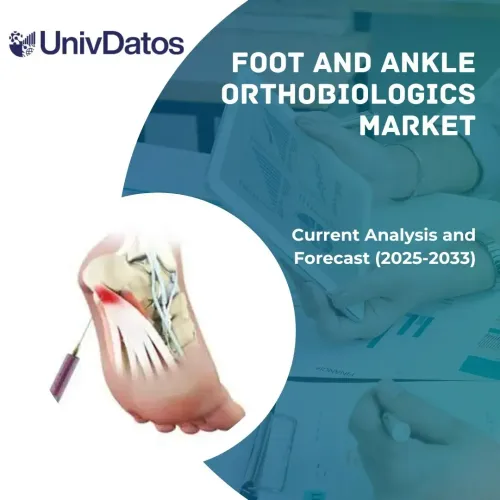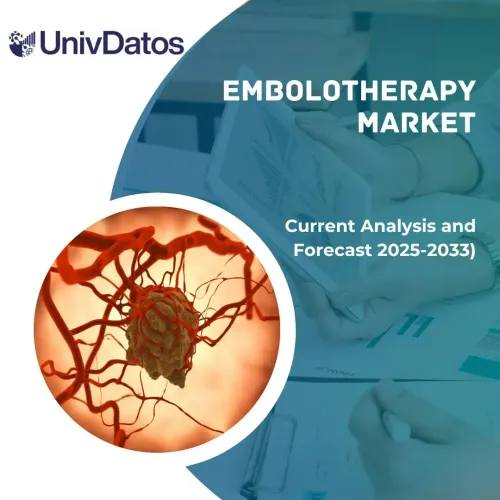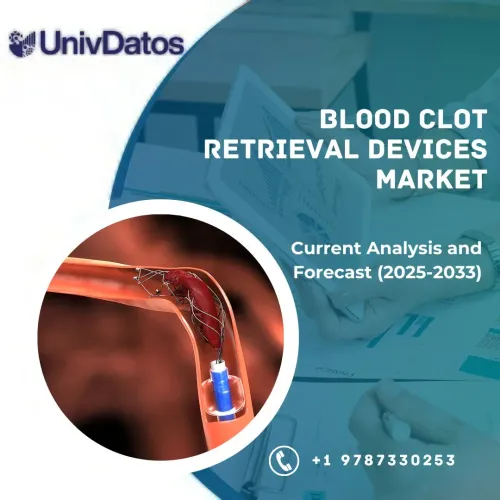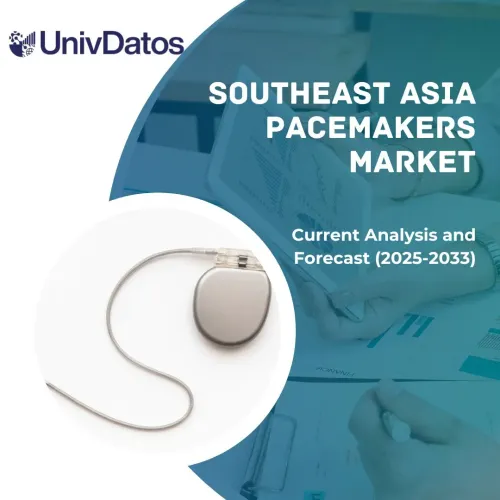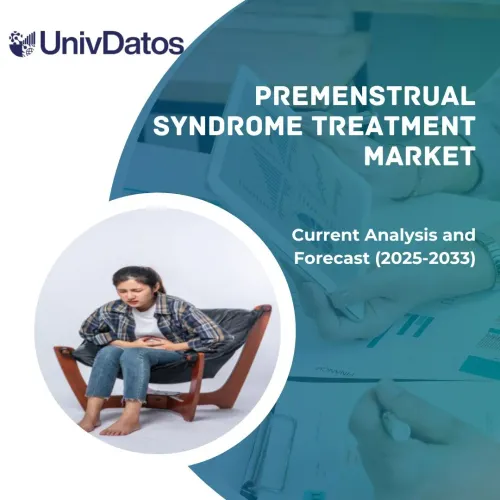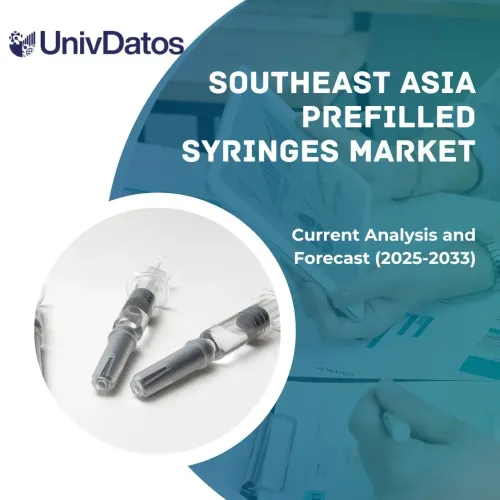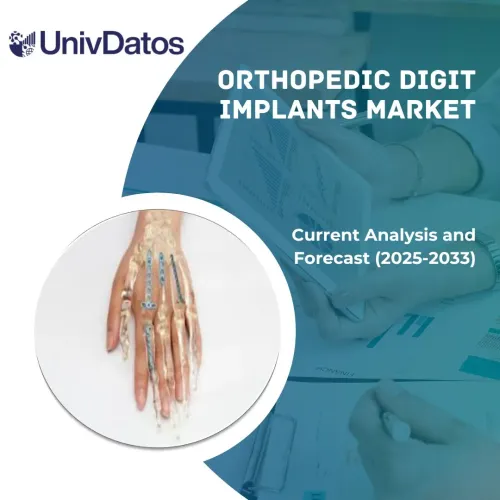- Home
- About Us
- Industry
- Services
- Reading
- Contact Us
Respiratory Monitoring Devices Market: Current Analysis and Forecast (2021-2027)
Emphasis on Product (Pulse Oximeters, Capnographs, Spirometers, Polysomnographs, Peak Flow Meters, Gas Analyzers, Others); End-User (Home Care, Hospitals, Ambulatory Surgical Centers, Specialty Clinics); Region and Country
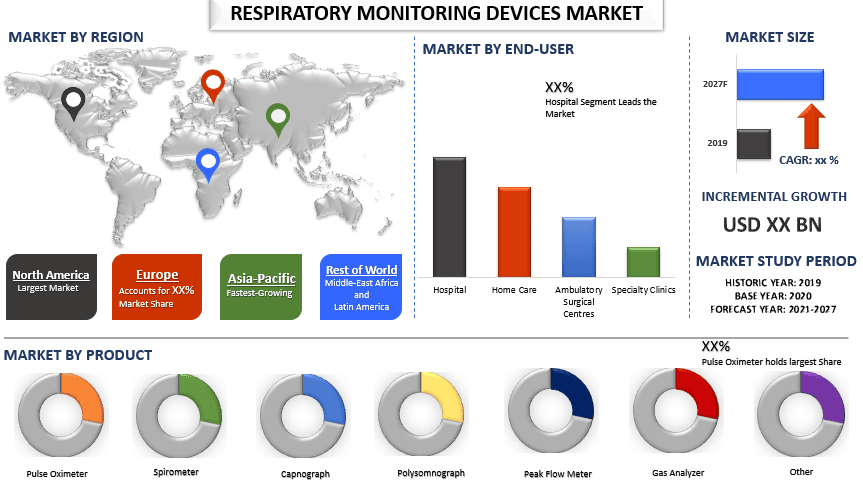
Respiratory Monitoring Devices Market is expected to grow at a CAGR of ~10% over the forecast period (2021-2027). Respiratory diseases, such as respiratory infections, asthma, lung cancer, and COPDs are increasing at an alarming rate and are the leading cause of death all around the globe. Hence, the manufacturers operating in the market are innovating in wearable strain sensors for effective management of chronic respiratory diseases (CRDs). Increasing efforts to introduce wearable sensors capable of providing measurements on respiration rate as well as volume with high fidelity are further boosting the demand for respiratory monitoring devices. To offer more convenience to patients, manufacturers are increasing their production capabilities of disposable wearable sensors.
Respiratory Monitoring Devices are mainly developed for the supervision and counseling of patients dealing with respiratory disorders. These devices offer various advantages such as adherence trackers, dose reminders, and monitoring of various diseases such as asthma, clinically isolated syndrome, Chronic Obstructive Pulmonary Disease (COPD), diabetes, and hypertension. Moreover, the sensors incorporated in the delivery devices help to monitor the side effects and evaluation of the effect of change in dose. The adherence trackers help to check whether the patients are taking the required dose at right time or not, whereas the apps associated with the connected delivery devices help to record the effect of treatment, the safety of dose, and tolerability.
The Respiratory Monitoring Devices market is growing exponentially on account of increasing penetration of the Internet of Things (IoT) in monitoring devices, increasing focus on patient compliance, quality of healthcare, rising awareness of costs, increasing use of self-administered drugs, rising healthcare programs, and initiatives to spread the connected drug delivery devices awareness. For example, Propeller Health company has conducted around 60 connected medical programs to spread awareness of connected drug delivery devices. The company provides add-on devices for inhalers that are synchronized with the patient’s software for the analysis of symptoms and diseases.
National Asthma Prevalence (%), 2019
Medtronic, Philips Healthcare (Koninklijke Philips N.V.), Dragerwerk AG & Co. KGaA, GE Healthcare, Smiths Medical, Masimo, Resmed, Siemens Healthcare, Hamilton Medical and Vyaire Medical Inc. are some of the prominent players operating in the global Respiratory Monitoring Devices market. Several M&A’s along with partnerships have been undertaken by these players to develop new and advanced Respiratory Monitoring Devices products.
Insights Presented in the Report
“Amongst product, pulse oximeters segment holds the major share”
Based on products, the market is fragmented into pulse oximeters, capnographs, spirometers, polysomnographs, peak flow meters, gas analyzers, and others. The pulse oximeters segment generated revenue of USD XX million in 2020 and is expected to grow at a CAGR of XX% during the forecast period to reach a market valuation of USD XX million by 2027F. The dominance of this segment can be attributed to high use of pulse oximeter for anesthesia during surgery, advancements in artificial intelligence, increase in mobile-based platforms, growing use of wearable devices, advancements in the microprocessor technology along with continuous innovations in the photoelectric sensors. Moreover, the wide application of the product in various diseases such as cardiovascular disease, sickle cell anemia, and other chronic respiratory diseases also propels the market growth. For instance, in January 2020, WHO declared the novel coronavirus outbreak a public health emergency of international concern (PHEIC), which led to the high demand for pulse oximeters.
“Amongst end-user, the hospitals segment holds the major share”
Based on end-users, the market is fragmented into home care, hospitals, ambulatory surgical centers, and specialty clinics. The hospitals segment generated revenue of USD XX million in 2020 and is expected to grow at a CAGR of XX% during the forecast period to reach a market valuation of USD XX million by 2027F owing to high use and adoption of the respiratory monitoring devices. Today, the COVID-19 pandemic has led to the high demand for oxygen administration as supportive management. As per the Pan American Health Organization, 75% of all hospitalized patients require supplemental oxygen treatment.
“North America signifies one of the largest markets of Respiratory Monitoring Devices Market”
For a better understanding of the market dynamics of the Respiratory Monitoring Devices market, a detailed analysis was conducted for different regions across the globe including North America (United States, Canada, and the Rest of North America), Europe (Germany, France, Italy, Spain, United Kingdom and Rest of Europe), Asia-Pacific (China, Japan, India, South Korea, and Rest of APAC), Rest of World has been conducted. North America dominated the market and generated revenue of USD XX million in 2020 owing to period owing to surging prevalence of respiratory diseases and rise in per capita health expenditure in the region. At the same time, Asia-Pacific is anticipated to grow at the highest CAGR of XX% during the forecast period.
Reasons to buy this report:
- The study includes market sizing and forecasting analysis validated by authenticated key industry experts
- The report presents a quick review of overall industry performance at one glance
- The report covers an in-depth analysis of prominent industry peers with a primary focus on key business financials, product portfolio, expansion strategies, and recent developments
- Detailed examination of drivers, restraints, key trends, and opportunities prevailing in the industry
- The study comprehensively covers the market across different segments
- Deep dive regional level analysis of the industry
Customization Options:
The Respiratory Monitoring Devices market can further be customized as per the requirement or any other market segment. Besides this, UMI understands that you may have your own business needs, hence feel free to connect with us to get a report that completely suits your requirements.
Table of Content
Analyzing the historical market, estimation of the current market, and forecasting the future market of the Global Respiratory Monitoring Devices Market were the three major steps undertaken to create and analyze the adoption of Respiratory Monitoring Devices for the different diseases across major regions globally. Exhaustive secondary research was conducted to collect the historical market numbers and estimate the current market size. Secondly, to validate these insights, numerous findings and assumptions were taken into consideration. Moreover, exhaustive primary interviews were also conducted, with industry experts across the value chain of Respiratory Monitoring Devices. Post assumption and validation of market numbers through primary interviews, we employed a top-down approach to forecast the complete market size. Thereafter, market breakdown and data triangulation methods were adopted to estimate and analyze the market size of segments and sub-segments the industry pertains to. Detailed methodology is explained below:
Analysis of Historical Market Size
Step 1: In-Depth Study of Secondary Sources:
Detailed secondary study was conducted to obtain the historical market size of the Respiratory Monitoring Devices market through company internal sources such as annual report & financial statements, performance presentations, press releases, etc., and external sources including journals, news & articles, government publications, competitor publications, sector reports, third-party database, and other credible publications.
Step 2: Market Segmentation:
After obtaining the historical market size of the Respiratory Monitoring Devices market, we conducted a detailed secondary analysis to gather historical market insights and share for different segments for major regions. Major segments included in the report are product and end-user. Further country-level analyses were conducted to evaluate the overall utilization of Respiratory Monitoring Devices in every region.
Step 3: Factor Analysis:
After acquiring the historical market size of different segments and sub-segments, we conducted a detailed factor analysis to estimate the current market size of Respiratory Monitoring Devices market. Further, we conducted factor analysis using dependent and independent variables such as Increasing prevalence of smoking and rising government funded initiatives. A thorough analysis was conducted for demand and supply-side scenario considering top partnerships, merger and acquisition, business expansion, and product launches in the Respiratory Monitoring Devices industry across the globe.
Current Market Size Estimate & Forecast
Current Market Sizing: Based on actionable insights from the above 3 steps, we arrived at the current market size, key players in the Respiratory Monitoring Devices market, and market shares of the segments. All the required percentage shares split, and market breakdowns were determined using the above-mentioned secondary approach and were verified through primary interviews.
Estimation & Forecasting: For market estimation and forecast, weights were assigned to different factors including drivers & trends, restraints, and opportunities available for the stakeholders. After analyzing these factors, relevant forecasting techniques i.e. top-down/bottom-up approach was applied to arrive at the market forecast about 2027 for different segments and subsegments across the major markets globally. The research methodology adopted to estimate the market size encompasses:
- The industry’s market size, in terms of value (USD) and the utilization rate of Respiratory Monitoring Devices across the major markets domestically
- All percentage shares, splits, and breakdowns of market segments and sub-segments
- Key players in the Respiratory Monitoring Devices market in terms of services offered. Also, the growth strategies adopted by these players to compete in the fast-growing market
Market Size and Share Validation
Primary Research: In-depth interviews were conducted with the Key Opinion Leaders (KOLs) including Top Level Executives (CXO/VPs, Sales Head, Marketing Head, Operational Head, and Regional Head, Country Head, etc.) across major regions. Primary research findings were then summarized, and statistical analysis was performed to prove the stated hypothesis. Inputs from primary research were consolidated with secondary findings, hence turning information into actionable insights.
Split of Primary Participants in Different Regions
Market Engineering
Data triangulation technique was employed to complete the overall market estimation and to arrive at precise statistical numbers of each segment and sub-segment of the Respiratory Monitoring Devices market. Data was split into several segments & sub-segments post studying various parameters and trends in the areas of product and end-user of the Respiratory Monitoring Devices market.
Main Objective of the Respiratory Monitoring Devices Market Study
The current & future market trends of Respiratory Monitoring Devices were pinpointed in the study. Investors can gain strategic insights to base their discretion for investments from the qualitative and quantitative analysis performed in the study. Current and future market trends were determined the overall attractiveness of the market at a regional level, providing a platform for the industrial participant to exploit the untapped market to benefit as a first-mover advantage. Other quantitative goals of the studies include:
- Analyze the current and forecast market size of Respiratory Monitoring Devices in terms of value (USD). Also, analyze the current and forecast market size of different segments and sub-segments
- Segments in the study include areas of product and end-user
- Define and analysis of the regulatory framework for the Respiratory Monitoring Devices industry
- Analyze the value chain involved with the presence of various intermediaries, along with analyzing customer and competitor behaviors of the industry
- Analyze the current and forecast market size of the Respiratory Monitoring Devices market for the major region
- Major regions studied in the report include North America (United States, Canada, and the Rest of North America), Europe (Germany, France, Italy, Spain, United Kingdom and Rest of Europe), Asia-Pacific (China, Japan, India, South Korea, and Rest of APAC), and Rest of the World
- Company profiles of the Respiratory Monitoring Devices market and the growth strategies adopted by the market players to sustain in the fast-growing market
- Deep dive regional level analysis of the industry
Related Reports
Customers who bought this item also bought



